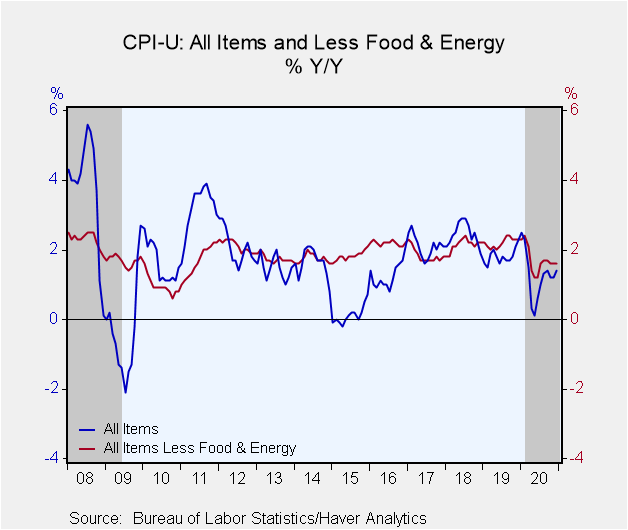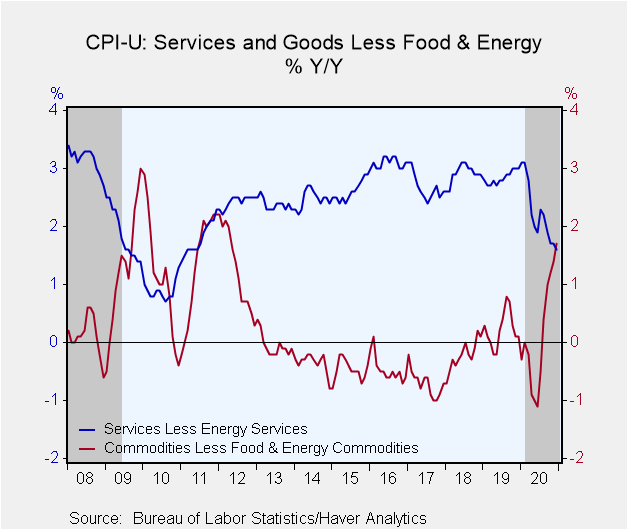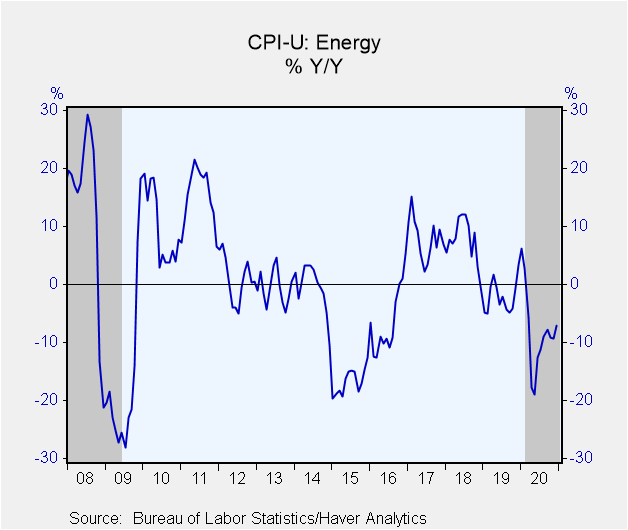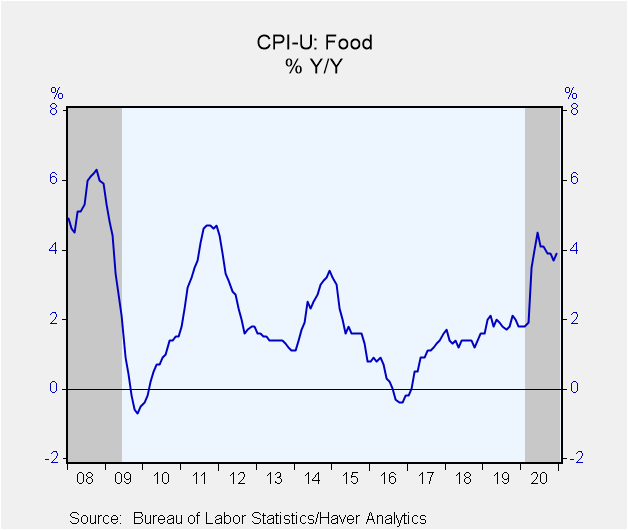 Global| Jan 13 2021
Global| Jan 13 2021U.S. Consumer Price Inflation Picks Up in December; Core Price Gain Decelerates
by:Tom Moeller
|in:Economy in Brief
Summary
• Energy & food prices strengthened last month. • Pricing power in 2020 remained under control. • Goods price inflation inched up while services decelerated. Retail pricing power remained limited last year. The Consumer Price Index [...]
• Energy & food prices strengthened last month.
• Pricing power in 2020 remained under control.
• Goods price inflation inched up while services decelerated.
Retail pricing power remained limited last year. The Consumer Price Index rose 0.4% during December following a 0.2% November rise. The gain matched expectations in the Action Economics Forecast Survey. Year-to-year, the index advanced 1.4%. The CPI excluding food & energy edged 0.1% higher last month following a 0.2% rise. A 0.2% gain had been expected. During the last twelve months, prices rose 1.6%.
A 4.0% increase (-7.0% y/y) in energy product prices bolstered the rise in retail prices last month as it followed a 0.4% rise in November. Fuel oil prices surged 10.2% (NSA, -20.0% y/y) following a 3.6% rise. Gasoline prices rebounded 8.4% (-15.2% y/y) after easing 0.4%. The cost of electricity increased 0.4% (2.2% y/y) while natural gas prices eased 0.8% (+4.1% y/y) after a 3.1% gain.
Food prices improved 0.4% and by a strengthened 3.9% y/y, after easing 0.1% in November. Food-at-home prices also rose 0.4% (3.9% y/y). The increase reflected a 1.1% strengthening (4.4% y/y) in the cost of nonalcoholic beverages. Dairy prices strengthened 0.8% (4.4% y/y) while cereal & bakery product costs rose 0.4% (3.2% y/y). Elsewhere, pricing power was tame last month. Meat, poultry & fish prices held steady (5.0% y/y). Egg prices declined 3.5% (-1.5% y/y) while fruit & vegetable prices eased 0.2% (+3.2% y/y). Prices for food away from home rose 0.4% (3.9% y/y).
Goods prices excluding food & energy improved 0.2% last month (1.7% y/y) after edging 0.1% higher during November. Apparel prices surged 1.4% (-3.9% y/y) after gaining 0.9% in November. Sporting goods prices rose 0.5% (2.5% y/y) after rising 0.7%. Prices for education & communication goods increased 0.8% (-2.5% y/y) following a 0.4% rise. New vehicle prices rose 0.4% (2.0% y/y). Recreation product prices improved 0.2% (-0.2% y/y). To the downside were used car & truck prices which fell 1.2% (+10.0% y/y) following two months of easing prices. Medical care product costs fell 0.4% (-2.5% y/y), the fourth decline in the last five months. Household furnishings prices slipped 0.1% last month (2.9% y/y) after rising 0.9%. Household appliance prices fell 0.2% (+6.2% y/y) after strengthening 2.2% in November.
Services prices improved 0.1% in December (1.6% y/y) after a 0.2% rise. Shelter costs rose 0.1% for the fifth straight month and by a greatly lessened 1.8% y/y. The owners' equivalent rent of primary residences also rose 0.1% and gained 2.2% y/y. Education & communication services prices improved 0.1% (2.3%y/y) following no change in November. Falling were recreation services prices by 0.5% (1.6% y/y) which fully reversed November's increase. The cost of public transportation fell 0.7% (-12.0% y/y). Medical care services prices eased 0.1% (+2.8% y/y), down for the third straight month.
The Consumer Price Index data can be found in Haver's USECON database with additional detail in CPIDATA. The Action Economics survey figure is in the AS1REPNA database.
The Fed's latest Beige Book covering regional economic conditions can be found here.
| Consumer Price Index, All Urban Consumers (% chg) | Dec | Nov | Oct | Dec Y/Y | 2020 | 2019 | 2018 |
|---|---|---|---|---|---|---|---|
| Total | 0.4 | 0.2 | 0.0 | 1.4 | 1.2 | 1.8 | 2.4 |
| Total less Food & Energy | 0.1 | 0.2 | 0.0 | 1.6 | 1.7 | 2.2 | 2.1 |
| Goods less Food & Energy | 0.2 | 0.1 | -0.2 | 1.7 | 0.1 | 0.2 | -0.2 |
| Services less Energy | 0.1 | 0.2 | 0.1 | 1.6 | 2.2 | 2.8 | 2.9 |
| Food | 0.4 | -0.1 | 0.2 | 3.9 | 3.4 | 1.9 | 1.4 |
| Energy | 4.0 | 0.4 | 0.1 | -7.0 | -8.5 | -2.1 | 7.5 |
Tom Moeller
AuthorMore in Author Profile »Prior to joining Haver Analytics in 2000, Mr. Moeller worked as the Economist at Chancellor Capital Management from 1985 to 1999. There, he developed comprehensive economic forecasts and interpreted economic data for equity and fixed income portfolio managers. Also at Chancellor, Mr. Moeller worked as an equity analyst and was responsible for researching and rating companies in the economically sensitive automobile and housing industries for investment in Chancellor’s equity portfolio. Prior to joining Chancellor, Mr. Moeller was an Economist at Citibank from 1979 to 1984. He also analyzed pricing behavior in the metals industry for the Council on Wage and Price Stability in Washington, D.C. In 1999, Mr. Moeller received the award for most accurate forecast from the Forecasters' Club of New York. From 1990 to 1992 he was President of the New York Association for Business Economists. Mr. Moeller earned an M.B.A. in Finance from Fordham University, where he graduated in 1987. He holds a Bachelor of Arts in Economics from George Washington University.
More Economy in Brief
 Global| Feb 05 2026
Global| Feb 05 2026Charts of the Week: Balanced Policy, Resilient Data and AI Narratives
by:Andrew Cates










